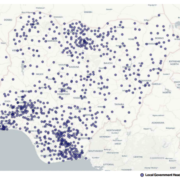
Top 50
“WARM-UP NOTES” in Special Report on Nigeria Digital Economy at the Nigeria’s Top 50 Digital Economy Enablers 2023.
By Abdul-Hakeem Ajijola (.AhA).

For society and its socio-economic activities to survive and sustainably prosper they must engender confidence, which requires Trust built on Security. Confidence in Nigeria’s Digital Economy requires Trust built on Cybersecurity. Trust is key – without trust based on cybersecurity no one will use digital platforms. Society and its organisations require trust to optimally function. Such confidence is predicated on the confidentiality, integrity, and availability as appropriate, of information especially as data is increasingly digitised across our society.
A successful national digital economy is one that leverages digital technologies to support economic growth and development; creates new opportunities for businesses and individuals; and enhances the quality of life for citizens especially our youth and those in the lower cadres of society; and customarily disadvantaged groups. The key characteristics of a successful national digital economy include:
- Robust broadband infrastructure including a well-developed broadband infrastructure that provides fast, reliable, and secure access to digital technologies and services.
- A workforce with digital skills is essential for a successful national digital economy, as these skills are required to take advantage of the opportunities offered by digital technologies.
- A diverse and growing range of digital industries, such as e-commerce, digital media, and software development, which create new job opportunities and drive economic growth.
- A supportive legal and regulatory framework that provides a predictable and stable environment for businesses and individuals to participate in the digital economy is critical for its success.
- A high level of trust in digital technologies, including secure online payments, privacy, and data security, is essential for a successful national digital economy, as it enables individuals and businesses to participate in the digital economy with confidence.
- An efficient and effective government services that are delivered online, reducing costs, increasing accessibility, and enhancing the quality of life for citizens.
- Strong public-private partnerships that bring together government, business, and academia to support the development and growth of the digital economy.
By meeting these criteria, a national digital economy can support economic growth, create new opportunities for businesses and individuals while enhancing the quality of life for citizens.
Cybersecurity is a critical issue for Nigeria’s digital economy, as it affects the overall trust and confidence in the use of digital technologies and services. With a rapidly growing internet population and increasing adoption of digital technologies, there is a growing risk of cyber-attacks, data breaches, and other forms of cybercrime. To address these risks, Nigeria’s society through its government, private sector academia, civil society and other stakeholders must collaborate to develop and enhance cybersecurity measures towards protecting citizens and organisations from cyber threats. Specific steps that can be taken include to address Cybersecurity and Nigeria’s Digital Economy include:
- Implementation of strong and clear cybersecurity laws and regulations that place to protect citizens’ personal data and privacy, as well as to prosecute those who engage in cybercrime.
- Essential investments in the development of its cybersecurity infrastructure, including the creation of a national cyber security centre to monitor and respond to cyber threats.
- The government, private sector, academia, civil society and the media must work together to raise awareness of cybersecurity issues among citizens and businesses and provide training and education programs to enhance digital literacy and cyber safety.
- Encourage public-private partnerships where the government and private sector work together to share information, coordinate responses to cyber threats, and support research and development of new cybersecurity technologies.
- Nigeria should collaborate with other countries and international organizations to tackle cross-border cybercrime and improve global cybersecurity standards.
Taking these steps will empower Nigeria to build a secure digital economy that supports economic growth and social development, while protecting citizens and businesses from the risks of cybercrime.
Nigeria’s Digital Economy – Myth or Fact? The concept of Nigeria’s digital economy is both a myth and a fact. On one hand, the potential for a thriving digital economy in Nigeria is a fact, as the country has a large, youthful, dynamic intelligent, and growing population; increasing internet penetration; and a rapidly growing tech sector. Additionally, there is a growing recognition locally, and globally, of the importance of digital technologies in driving economic growth and development in Nigeria.
On the other hand, the actual realization of a successful digital economy in Nigeria is still largely a myth, as there are several significant challenges that need to be overcome. These challenges include a lack of access to reliable and affordable broadband, low levels of digital literacy, limited e-commerce infrastructure, and limited cybersecurity measures. Other major challenges to the growth and development of Nigeria’s digital economy:
- Many individuals and businesses in Nigeria lack knowledge and understanding of cybersecurity best practices, which leaves them vulnerable to cyberattacks.
- The current cybersecurity infrastructure in Nigeria is inadequate, lacking the necessary tools, technologies, and coordination to protect against cyberattacks.
- There is a lack of regulations and standards in place in Nigeria to ensure the security and privacy of digital information and transactions.
- The quality of software and hardware used in Nigeria is often poor, especially the use of pirated software making them vulnerable to security breaches and exploits.
- The lack of optimal investment in cybersecurity in Nigeria, limits the resources available for the development of secure digital technologies and services.
- The capacity for incident response in Nigeria is nascent, making it difficult for organizations to respond effectively to cyberattacks.
- The supply chain for digital technologies and services in Nigeria is often weak, increasing the risk of security breaches and exploits.
These challenges must be addressed to ensure the continued growth and development of Nigeria’s digital economy and to build trust in digital technologies and services among citizens and businesses. This can be done by implementing robust cybersecurity regulations, standards, and policies; investing in cybersecurity education and awareness programs; and supporting the development of a robust cybersecurity infrastructure. With the right investments in people, processes, and technology, Nigeria has the potential to become a leading digital economy in Africa, creating new economic opportunities and driving growth and development across the country. By addressing the challenges and harnessing the potential of digital technologies, Nigeria can move towards becoming a successful digital economy and realizing its full potential as a global player in the digital age.
A digital society is one in which digital technologies are deeply integrated into every aspect of life, from communication and commerce to education and healthcare. The building blocks of a digital society include:
- A robust and reliable broadband infrastructure is the foundation of a digital society, providing fast, reliable, and secure access to digital technologies and services.
- A workforce with digital skills, as these skills are required to take advantage of the opportunities offered by digital technologies.
- Digital technologies and devices, such as smartphones, computers, and the internet, are the cornerstone of a digital society, enabling individuals and businesses to participate in the digital economy.
- Efficient and effective e-government services that are delivered online, reducing costs, increasing accessibility, and enhancing the quality of life for citizens.
- Secure and reliable online payments infrastructure is essential for a digital society, as it provides consumers with confidence in the security and privacy of their online transactions.
- Data privacy and security, as trust in the security and privacy of personal and sensitive information is critical for the continued growth and development of the digital economy.
- Strong public-private partnerships that bring together government, business, and academia to support the development and growth of the digital society are essential for its success.
These building blocks ensure that a digital society can support economic growth; create new opportunities for businesses and individuals; and enhance the quality of life for citizens. Furthermore for Nigeria to build a robust digital economy it needs to invest in the following cybersecurity infrastructure as part of its developmental roadmap:
- Implement a nationwide campaign to raise awareness and educate individuals and businesses about the risks associated with digital technologies and services and the importance of cybersecurity.
- Develop and implement regulations and standards to ensure the security and privacy of digital information and transactions. This should include data protection laws, cybersecurity standards, and regulations for the use of digital technologies and services.
- Increase investment in cybersecurity to support the development of secure digital technologies and services and strengthen Nigeria’s cybersecurity infrastructure. This can be achieved through government funding, private investment, and public-private partnerships.
- Enhance Nigeria’s capacity to respond to cyberattacks and minimize their impact. This can be achieved through the development of a cybersecurity response plan and the training of personnel in incident response procedures.
- Strengthen the security of the supply chain for digital technologies and services to ensure that the technologies and services used in Nigeria are secure and of high quality.
- Foster the development of cybersecurity research and innovation in Nigeria to support the development of secure digital technologies and services.
- Foster partnerships between the public and private sectors to support the development of a robust cybersecurity infrastructure for Nigeria’s digital economy.
- Continuously monitor and evaluate the implementation of this road map and make adjustments as necessary to ensure the continued development of a robust cybersecurity infrastructure for Nigeria’s digital economy.
The above road map outline must be flexible and adaptable to the changing needs of Nigeria’s digital economy and the evolving cybersecurity landscape. It should be reviewed and updated regularly to ensure that it remains relevant and effective in supporting the growth and development of Nigeria’s digital economy.
Let us work together and coherently to put in place by the year 2030 a micro-small and medium enterprises based Cyber Security Solutions economic sub-sector principally driven by suitably empowered knowledge workers below 35 years of age. So highly skilled Cybersecurity knowledge workers will constitute a cyber-guard that the nation will leverage, in times of national cyber emergencies. To this end we need to take the following steps to create a Cybersecurity Economy:
- Establish a national cybersecurity strategy, which we have done. Our National Cybersecurity Policy and Strategy (NCPS) 2021 is crucial for guiding and coordinating our efforts at building a robust cybersecurity economy. This strategy sets clear goals, priorities, and plans for improving the overall security of the country’s digital infrastructure and protecting its citizens and businesses from cyber threats.
- Invest in cybersecurity infrastructure, including firewalls, intrusion detection and prevention systems, and encryption technologies, is essential for protecting sensitive data and networks. This investment should be made at the national, state, business, and individual levels.
- Creating a culture of cybersecurity awareness is critical for reducing the risk of cyber threats. This can be achieved through education and awareness programs for businesses, individuals, and the general public, as well as regular training for employees.
- Developing a highly skilled and well-trained cybersecurity workforce is crucial for building a strong and resilient cybersecurity economy. This can be done through education and training programs, certification programs, and partnerships with private sector companies.
- Encouraging innovation and entrepreneurship in the cybersecurity sector is essential for driving growth and competitiveness. This can be done through tax incentives, grants, and other support mechanisms for startups and small businesses.
- Promoting international cooperation is important for addressing transnational cyber threats and ensuring the protection of critical infrastructure and information systems. This can be done through partnerships with international organizations and other countries, as well as participation in international forums and initiatives focused on cybersecurity.
- Implementing robust regulations and standards is crucial for ensuring the security and privacy of sensitive information and critical infrastructure. This can be done through the development of standards and best practices, as well as through the enforcement of regulations and laws.
By leveraging the aforementioned, Nigeria can create a strong and resilient cybersecurity economy that protects its citizens, organisations, and reputation from cyber threats; drives innovation and growth; and contributes to overall economic prosperity.
 Abdul-Hakeem Ajijola (.AhA): [email protected]. 14 February 2023 @ The Nigeria’s Top 50 Digital Economy Enablers 2023
Abdul-Hakeem Ajijola (.AhA): [email protected]. 14 February 2023 @ The Nigeria’s Top 50 Digital Economy Enablers 2023





























